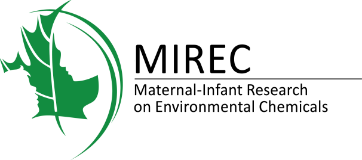
Prenatal exposure to perfluoroalkyl substances and inflammatory biomarker concentrations.
Jana P, Bruin JE, Kumarathasan P, MacPherson SH, Borghese, MM, Ashley-Martin J. Environmental Epidemiology 7(4):p e262, August 2023. | DOI: 10.1097/EE9.0000000000000262
Question: Does prenatal exposure to perfluoroalkyl substances (PFAS) affect inflammation in mothers during pregnancy?
PFAS are chemicals used in many consumer products such as cookware, clothing, and furniture for their unique oil-, water-, and heat-resistant properties. Despite the widespread use of PFAS in consumer products, few studies have investigated whether exposure to PFAS is associated with biomarkers of inflammation during pregnancy. Inflammatory biomarkers are biological molecules in the blood that show if and how much inflammation – a part of the body’s natural defense mechanisms – is occurring in the body. It is particularly important to understand if chemicals such as PFAS disrupt inflammation during pregnancy, because a healthy pregnancy requires maintaining a balance between too much and too little inflammation.
What did the researchers do:
Chemists measured levels of three different PFAS in first trimester blood and levels of 19 different inflammatory biomarkers in third trimester blood collected from MIREC participants. From these biomarkers, the researchers created a score that reflects overall systemic inflammation. They used statistical models to examine the relationship between PFAS levels, inflammation biomarkers, and the inflammatory score during pregnancy. The researchers also determined whether these associations between PFAS and inflammation differed according to fetal sex.
What did they find:
Higher levels of PFAS were associated with an increase in the inflammatory score. All three PFAS were associated with certain individual inflammatory biomarkers. Furthermore, when considering the combined effects of all three PFAS, an increase in PFAS mixture levels was associated with a higher composite inflammatory score. Some associations between PFAS and biomarkers differed according to fetal sex.
What does this mean:
This research demonstrates that prenatal exposure to PFAS is associated with levels of inflammatory biomarkers. Future MIREC research will investigate if the PFAS exposure-related changes in inflammatory biomarkers observed in this study play a role in increasing chances of adverse maternal health outcomes.
MIREC Année all rights reserved - Privacy policy
Website by Riposte


